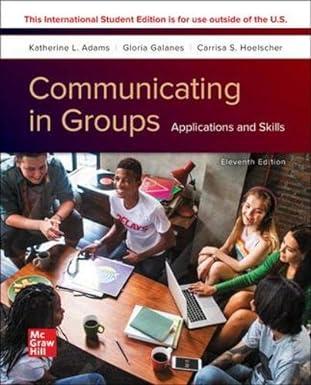Your local parent-teacher organization has received the following letter from one schools site council. The executive committee,
Question:
Your local parent-teacher organization has received the following letter from one school’s site council. The executive committee, of which you are a member, is meeting to decide what to recommend to the entire PTO. Practice evaluating the information and arguments in the letter.
Dear Parent-Teacher Organization Member, As you know, the vote to elect a new member to the school board will occur on April 5. We want you to know that the Parents’ Excellence in Schools Committee supports candidate Mary Alice Beasley for our school board.
Mary Alice Beasley is the best candidate we have running for the Central City school board. We need people like her who care about our kids. She has lived in Central City all her life and now has three children of her own in the school system. She has been an active member of the P.T.O. for the past six years and was chair of the fund-raising committee for Westwood School. Her experience will be invaluable.
In her second term on city council, she was the chief author of the plan to desegregate the city schools; as we all know, other cities have used this plan as the model for their own desegregation efforts. Mary Alice can represent the entire community well—she taught for nine years before she ran for city council, and she has a master’s degree in education. Hers is exactly the kind of caring, experienced leadership we need on the school board. Mary Beasley deserves your endorsement. Remember to vote on April 5.
Either individually or in groups of four to six, answer the following questions and then discuss them as a class:
1. What conclusion are you being asked to reach? Is there an action you are being asked to take in this letter?
2. Like most letters of this type, this letter interchanges fact and inference, or opinion. Make a list of all the facts presented in the letter and a list of all the inferences presented.
3. Ambiguous terms are sometimes difficult to spot because we each think we know what words such as experienced mean. Make a list of all the ambiguous terms (terms that can reasonably be understood in more than one way) presented in the letter. Before you assess how the letter writer interprets each of these terms, what do you mean by each of them? For instance, what does experienced mean to you?
4. For each of these terms, what evidence is presented in the letter that supports the author’s opinion about Beasley? For example, what facts are presented to support the author’s view that Beasley is “experienced”?
5. Would you vote for Beasley on the basis of this letter? Why or why not? What other information about this candidate would you like to have to help you make your decision? Where would you go for the information you need?
Step by Step Answer:

Communicating In Groups Applications And Skills
ISBN: 9781260570786
11th Edition
Authors: Katherine Adams, Gloria Galanes





